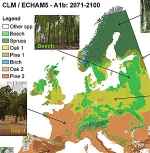 By 2100 climate change is expected to reduce the economic value of forest land by 14 to 50%, which equates to a potential damage of several hundred billion euros unless effective countermeasures are taken. This is the conclusion of the first pan-European study on the economic effects of climate change on forest land. By 2100 climate change is expected to reduce the economic value of forest land by 14 to 50%, which equates to a potential damage of several hundred billion euros unless effective countermeasures are taken. This is the conclusion of the first pan-European study on the economic effects of climate change on forest land.
“The study shows us a dramatic impact on European forests when there is no timely curbing of climate change, or when forest management does not adapt to a climate change in time. It is now urgent to investigate adaptation options, and to build awareness concerning climate change impacts, and adaptation amongst forest managers and the forest sector”, says Gert-Jan Nabuurs from EFI, a member of the international team of scientists led by Marc Hanewinkel from the Swiss Federal Research Institute WSL carrying out the study.
The study analysed three out of the 40 IPCC climate change scenarios. The results indicate that climate change is expected to strongly affect tree species distribution within European forests. By 2100, when Norway spruce might have disappeared in many regions, between 21 and 60% (34% on average) of European forest land will be suitable only for a Mediterranean oak forest type with low economic returns for the timber industry. These slow growing forests will also sequester less carbon than today's forests. By 2100 – depending on interest rate and climate scenario applied – the calculated loss varies between 14 and 50% (28% on average) of the current value of forest land in Europe. At the end of this century, the loss may total 190 billion euros on average under a moderate IPCC climate scenario and vary between 60 and 680 billion euros in all three climate scenarios.
Unless the climatic impact is compensated with countermeasures, Europe will have to cope with forests of less economic value and with less contribution to climate change mitigation than today’s more productive forests. At a minimum, adaptive management actions may be necessary, but even the introduction of more productive species from outside Europe such as Douglas Fir, Atlas Cedar, Pine or Eucalyptus species might have to be considered.
The article “Climate change may cause severe loss in the economic value of European forest land” by Marc Hanewinkel, Dominik A. Cullmann, Mart-Jan Schelhaas, Gert-Jan Nabuurs and Niklaus E. Zimmermann was published in Nature Climate Change, http://www.nature.com/nclimate/journal/vaop/ncurrent/full/nclimate1687.html
The study was carried out within the MOTIVE-project.
See Attached files here:
|

